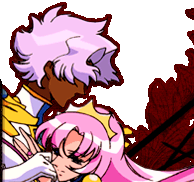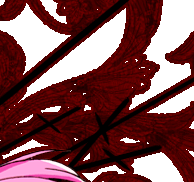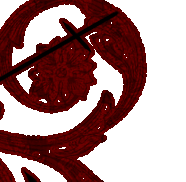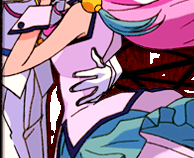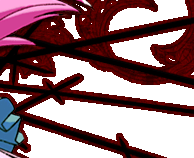

Shoujo Kakumei Utena was aimed at a young audience in Japan, but sexuality is nevertheless a dominating theme in the show, and nothing illustrates that quite as clearly as the villain. Akio stands at the center of a whirlwind of sexual activity, and as with anything else in Utena there are layers to peel; what does he look for and value in sex, and what kind of partner does it make him? What does his sexuality say about him? Why is sex so prominent among his methods of manipulation? This essay is the spiritual successor to a far older one I wrote on Akio’s sexual behaviors. I intend here to dig deeper and broaden the scope of what’s covered, and in the process say as much about what Akio represents and why as I’ve said before about what he does in bed.
Akio’s manipulative talents are undeniable, but sex is without question his preferred method. Though he takes this preference to an extreme, it’s not unwarranted and certainly no hindrance; we are sexual creatures, and no other single element of human nature covers so wide an array of drives. Sexuality is wrapped in layers of desire, self-esteem, trust, power, attachment, shame, guilt, and (perhaps why Akio chooses sex to wield over such a young group of people) it represents the border between childhood and adulthood. Like driving, it’s viewed by society as something strictly within the domain of adults. Of course, like driving, that’s a shared fallacious view: one can obtain a license and still thoroughly lack the maturity that should accompany it. Similarly, one can engage in sexual activity without the understanding to deal with what they’re doing, and often, younger people choose to have sex prematurely in the erroneous belief that it will make them grownups.
Sexual exploration peaks in late childhood, and it’s hard to ignore the coincidence of Dios’ fall occurring during this period. With Akio being born into a period integral to the development of a person’s sexuality, it’s likely that that exploration became basic to his personality. There’s even the possibility of sex being what ultimately created him from Dios; Anthy is portrayed in the flashbacks both as his tempter and his violator, and in a series so full of suggestion, it’s quite suspicious that these scenes play out in a setting we’ve seen so many times leading to a sexual tryst. (The saying ‘a roll in the hay’ comes to mind.)
Anthy’s influence or his own exploration, or a combination of the two; one way or another, Akio is created as a sexual creature. And why not? What purpose of his did sex not serve? A selfish indulgence in the senses, a way to entertain himself with the torment of others while simultaneously controlling them, and a way to keep his sister attached to him. Dios and Akio have in common the use of a ‘sword’ to achieve their goals, but the different swords they use betray as much as anything else how different their intentions are: Akio is far more interested in his own pleasure than he is in vanquishing the enemy and saving the day. Furthermore, in sex Akio found a replacement for any true maturity he might have gained. His enjoyment of it, and his skill in using it, became the proof of his adulthood. Why experience the pains and torments of growing up when he could just enjoy himself, and in the process, convince everyone else he was an adult anyway?
Sex as Akio internally defines it is missing a few features people tend to take for granted as there. There’s no emotional connection on Akio’s part. There’s no intimacy. There’s no respect. There’s no exclusivity. There are no boundaries. Akio pursues sex solely and completely out of interest in his own pleasure and what he may gain from it. Had he not found a taste for the act and all the trappings of it, and had he not so often an agenda, Akio could easily have turned out the sort to pump a few times and then kick you out. As it is, the series is rife with examples of his sensuality, his indulgence in his own senses, and the usually malicious foreplay he so clearly delights in. To simply have an orgasm is nothing notable; that he can as soon obtain on his own, and being as he’s human enough, he no doubt does. Sex offers far more than an orgasm. It offers watching Utena get flustered when he pulls her near. It offers Touga’s adorably flirtatious posturing. It offers Mrs.Ohtori’s shame in her inability to resist him. It offers feeling skin flush under his fingers, the taste of a drink on someone’s lips, the sound of moans choked out despite their source or released enthusiastically by it. It offers him the control to decide when any of these things happen.
If Akio could be accused of harboring a fetish, it would be for the emotional torment he can inflict on people. The only character we don’t see him sadistically antagonize as part of a sexual encounter is Anthy, perhaps because despite himself, he knows better. Utena, Touga, and Mrs.Ohtori all suffer at his hands, and the shame, denial, hatred, and confusion he draws out in them please him far more than the use of any whip or restraint. As far as more stereotypical fetishes go, he’d have none; sex is itself the fetish, and he’d see no point in distinguishing between kinds and acts beyond whimsy, instead choosing to toy with many and attach himself to none. Because he sees types of sex acts as all part of the same smorgasbord, he would let the curiosities and taboos of his lover dictate where he takes things. After all, he is neither especially interested in nor repulsed by say, spanking them, but if it will make them embarrassed, if it will turn them on, if it will gain him that much more control, he’s there. This is, as much as anywhere else, where his interest in tormenting people comes into clear focus. With no boundaries of his own, he’s free to toy with those of his partner, who likely doesn’t realize how far they’re capable of being pushed. There’s not much room in Akio for caring about a person’s open consent or comfort level, and how they feel in the morning isn’t going to matter either. If anything, Akio would enjoy the ‘challenge’ of pushing someone past what they were okay with only to see to it they come crawling back. As if he needed any help in doing so, this surely reinforces his own superiority over those around him; he wouldn’t pursue such torment, and they are fools for doing so themselves, but it would hardly surprise him to find others unable to resist his charms even when they’re left shaken and violated.
Akio benefits from his definition of sex so differing from that of others. Even sex as power, a concept most are familiar with, differs in the particulars. What one would consider a power play, Akio will not, and what one would consider simply the pursuit of pleasure, Akio sees isn’t. One example would be gay sex. By most peoples’ definition, there’s a top and a bottom, and one is clearly in a position to submit to the other. Certainly Akio sees the line of reasoning here and uses it where applicable, but on his own, it’s not how he defines control. To him, it’s things like the ability to give or take pleasure, inflict shame, and create dependency that make sex such a potentially powerful weapon. Manipulatively speaking, this creates a situation where his idea of power in sex depends largely on his partner’s.
To illustrate, let’s contrast Utena and Touga. Utena, with all her innocence and old school idealism about romance and sex, led Akio to adapt similarly classic views of what’s proper, especially given as he is to the goal of making her feel feminine, girly, and all around sexually submissive. With Utena, he’s on top in every sense of the word. Touga’s view of sex is broader; broad enough that a similarly domineering approach would have been insulting beyond what he would tolerate. Since Touga’s experiences have taught him you can be in control in just about any position on the bed, Akio has no reason to insist on one or another. In the silhouetted shot of them after they’ve finished their foreshadowing, the positioning is obvious; though Akio’s doing the penetrating, Touga is on top. This is the tip of the iceberg where it concerns their willingness to disregard the common rules of engagement, and it’s likely Akio and Touga share in the penetrating. After all, they both know the power doesn’t necessarily belong to the one thrusting, the one grabbing, or the one that kissed first. Utena, for her many reasons, doesn't understand this, and so Akio must adjust how he plays the game to fit her view of it. Taking this to the other extreme is what he does at the close of his scene with Mrs.Ohtori. He kneels in front of her and removes her shoe, but knowing her position and why she is there, this seemingly submissive act on his part only serves to underscore how vulnerable Mrs.Ohtori is to him.
All this conspires, despite his emotional abuse, to make him an attentive partner. A person may like, dislike, love, or hate him, but for obvious reasons (ego and self-interest among them), none of Akio’s schemes are improved by people being unattracted to him or displeased by his sexual performance. He may not be emotionally satisfying, and probably often isn’t; leaving someone feeling empty and unloved would be entertaining to him, especially since he’s probably got them willing to come back for more anyway. On the rare occasion he is emotionally satisfying, it’s manufactured on his part. Akio enjoys sex for its own sake, but would usually mean for it to be enjoyable for his partner. One could argue that he’s investing in their willingness to please him, but it’s equally likely he simply enjoys seeing what he can do to people. A woman that’s moaning and writhing under his touch is as thoroughly at his mercy as one that’s shrinking away from his advances, trying to explain her faithfulness to her prince. Though not above the smug satisfaction of being irresistible, by the time we meet him, he’s beyond gaining any self-esteem from it. Still, there was no doubt a time when Akio truly savored his ability to win over any lover, to see what they wanted, whether they realized it or not, and provide it so thoroughly that they couldn’t stay away no matter what else he did to them. By the series this is so a part of him that there’s no novelty or pride in it, beyond the occasional twinge of ‘Damn, I’m good.’ Akio simply takes it all as given. He knows what people want, he can provide it or not as he so wishes, and then have them clamoring for more.
Clearly, the view of sex embodied in a character like Akio is a dismal one, and while Akio is the primary lens through which we see sexuality in Revolutionary Girl Utena,, the behavior of other sexually active characters hardly redeems the act. Touga, when he’s not in bed with Akio himself, seduces half the female populace in the school and respects or cares for not a single one of them. Kozue uses sex to antagonize her brother; the men she drags into quiet corners are only the means to incite his shameful jealousy. Most of the other sexual characters are so with and through Akio, so one hardly needs to discuss the overall health of their sex lives.
There is no true counterargument in the series to the idea of sex we see from Akio. Not one healthy sexual relationship, and the only character you could even conjecture to have a decent outlook is Wakaba, whose sexuality is hardly addressed sufficiently to be a contrast to Akio’s. Why, then, does the series view sex so poorly? You could conclude that because sex is so heavily regarded as the domain of adults, that it follows the series would treat it as skeptically and disapprovingly as it views everything else about ‘grown-ups’. It could be a warning to its viewers about the dangers of sex, but that seems unlikely with the series lacking a ‘good example’ to follow. When you preach that way, you need a saint to shine light on the sinner. When it comes to the broader issue of how you should live your life, Akio is the bad example to Utena’s good, but sexually Utena is portrayed in a less than positive light herself. While her crimes certainly don’t match Akio’s, she ends up in bed with an engaged man, and the series doesn't try very hard to make it look like an honest mistake.
The sexual-mindedness of the people under Akio’s control does tend to indicate the grip he has on them. The more sexually aware they are, the more influence he has. This is most obvious with characters like Touga and Mrs.Ohtori, who are close to him, but Juri and Miki suffer terribly for their sexual awareness, contrasted to Nanami and Saionji, who are the first to give up the dueling game and also the least motivated by such 'adult' things. (Nanami’s attraction to Touga turns out to be nonsexual, and Saionji is far more concerned with the status Anthy offers than the sex, despite his ‘love’ for her.) Utena seems sexually innocent for most of the show but it’s plain from early on with her blushing whenever Touga crooks a finger that she is aware of her own sexual feelings. Her pitfall is that she’s completely at a loss for how to deal with or interpret them.
Whether Akio’s manipulative abilities falter with less sexual people, or whether it’s just that he’s less interested and so they get away more easily is hard to say. It would not be surprising that with such a focus being placed on sexual manipulation that other areas would be comparatively weak, but at the same time, Akio is himself so sexually minded that it’s possible he finds people that are much less so not worth his time. Because Akio justifies his adulthood by sexual means, he may even subconsciously make a point to interpret such people less effectively, proving he’s too sexual to think ‘down’ to that level. This is similar to how he misjudged Utena in the end, who he pointed out was very much like Dios. How inclined is he, who sees his former self as a fool, to truly relate to or understand someone like that?
Despite that possible weakness, there’s no one in the series, sexual or otherwise, that Akio finds difficult to control. Even the characters least motivated by sex (Nanami and Saionji) become keenly sexual under his influence; both find themselves suggestively draped over his car later in the series. It may take him a little more mental flexing to predict these characters, but he does so successfully, so perhaps it’s not really a weakness on his part but yet another connection we can draw to Akio as the representative fallen adult in the series. Adults in the show are all portrayed as driven by sex, power, and money, but especially by sex. (The power-hungry VP vying for a promotion to Amsterdam is first introduced to us when he hits rather hopelessly on Juri.) When that is the language familiar to you, any other is certainly challenging. Would Nanami’s parents ever understand how she felt without swearing up and down she had incestuous urges? What would Saionji’s father think about his apparent obsession with Touga?
Sexual awareness is very much like the wider definition of innocence and princely nobility in that it’s fragile, and once tampered with, almost impossible to mentally rewind. Dios cared so deeply for the welfare of others that his own meant nothing to him, but the man standing in his place now is incapable of relating to that. There was a time when Dios was sexually innocent, but for Akio it’s a vital part of his personality, too essential to his world view and too built upon to be removed without causing a complete collapse. He is an extreme, certainly, but Touga is human enough and walking down the same path. That he speaks the sexual language so fluently is part of why he sees himself as remotely capable of supplanting Akio.
In Akio the series suggests that the two, noble innocence and sexual innocence, are intertwined, and so easily lost simultaneously. This is an astute observation about life. It’s often in a person’s first encounters with sexuality that they experience the flood of argument against idealistic views. A child may experience shame long before they discover sex, but it’s when they do that shame often becomes a dominating theme in their psyche. It takes little to provoke youthful jealousy, but what’s brought up from that doesn’t hold a candle to the jealousy we experience concerning a lover. People can be cruel to children in many ways, but it’s when we encounter sex that we often learn the harshest lessons about how vicious people can be. (The sexual abuse of children is so damaging in part because of this premature exposure.) So often in sex we discover the worst of human nature, the selfishness, the shame, the lack of understanding, and the cruelty that brings down the idealism of goodness and closeness and caring that for many manage to prevail until that point.
The series is critical of sexuality, this border between childhood and adulthood, because there are many virtues in the innocent that sexuality can strip away. This is the challenge Utena is brought to by Akio. Her discovery of sex shakes to the very core her view of people, the world around her, and especially herself. Before that fated night would she ever think herself capable of sleeping with another woman’s fiancé? She never shakes the guilt of this act, and the reality of Akio’s relationship with Anthy does nothing to help Utena’s shattering world view. Of course, she does redeem herself. She does stand her ground in the face of this overwhelming evidence of the ugliness of the world. Akio took from her both her noble idealism and her sexual innocence. Against all odds she reclaims one of them, but the other is Akio’s prize.
Not that this prize decided Utena’s course; sex has no power over her without the damage it failed to cause to her nobility. This was his intent, he wanted a prince, and Utena proved herself capable of seeing the worst in human nature and not letting it stop her. Dios didn’t manage this, and it’s why he’s not the hero. Of course, like most hero characters, Utena’s ability to conquer all is exceptional. It's Akio who represents the majority, and the series illustrates this fact bitterly. After all there are no adults like Utena, and even most of the students are lacking her idealistic view. These characters are each in their own way advancing toward the same conclusions Dios came to about the reality of human nature, and the majority are finding these points most illustrated by sex. It’s the discovery of sex that Miki would naturally blame for his deteriorated relationship with his sister. An unhappy mistake of jealousy in youth becomes a festering wound in Juri by the introduction of a less innocent interest in Shiori. What can Touga think of women when his sex so easily reduces them to adoring, mindless drones? Watching this even from a distance, how could Saionji not come to the same conclusion?
We tend to be so eager to swim in the sexual pool, only to find it’s full of sharks. How can people keep thinking others are good at heart, that selfishness is wrong, and that one should live their lives without shame and regret when so much about sex begs to differ? Dios faltered in the face of it, and because of that weakness, Akio lets sex be both a primary motivation and his argument against any foolish idealism he himself involuntarily cast aside. Akio is fallen, full of the worst that man has to offer, magnifying it through the medium of sexuality. In large part thanks to him, no good comes of sex in the series, but we’re not allowed to write him off as having a villain’s twisted perspective. For all that he’s an archetype, an anime character, and (this exceptional) completely devoid of guilt, Akio is meant to represent the fallen adult the series suggests most of us are going to be. It's a great virtue to be Utena, to encounter the worst and walk away with that most valuable idealism intact. But our nature sides with Akio, who found in sex the ultimate way to express his selfishness.
It’s not hard to paint a negative picture of sex when you’re dealing with such an unrepentantly selfish character, but Akio creates an extreme that throws our own shortcomings about sex into relief. I admit, I envy Akio’s complete disregard for religious and cultural prohibitions, because I’m so bound up in them. I should think I’m not unique, or even unusual, among Revolutionary Girl Utena fans this way; like him or not, one has to admire how easy he makes it look to just not care. True, he should care about the ethical rightness of seducing an underage girl, but what of all the things he’d do without regret that truthfully, don’t need it anyway? Most of us have encountered restrictions on our sexuality based on what’s ‘good’ or ‘normal’. Masturbation is dirty, homosexuality is sinful, and any sort of sexual interest outside proper missionary style intercourse makes you a pervert. To examine a character like Akio tests our preconceptions about sex and our ability to differentiate objectively between things that are truly wrong and things we just think are wrong. In that process, one may move beyond an unreasonable restriction on their sexual expression, and so find comfort in a part of themselves they never needed to be ashamed of. Or, one may find their darker corners, desires they can’t quite make peace with, and so despite existing outside of Akio’s world, become one of his victims. In this he mirrors and represents sex itself. Both are created dangerous by the history of how they are perceived, and it’s that image you approach with that decides the damage that may or may not be caused by the encounter. Both only have the power you give them to create pain, shame, or sin, and to truly open your eyes to what’s in front of you denies them both the power to harm.
  |



